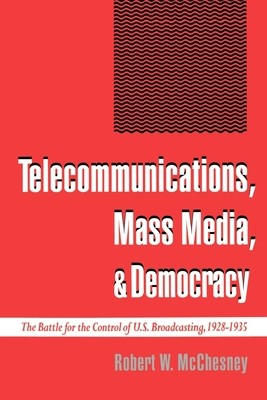
- We will send in 10–14 business days.
- Author: Robert W McChesney
- Publisher: Oxford University Press, USA
- ISBN-10: 0195093941
- ISBN-13: 9780195093940
- Format: 15.7 x 23.5 x 2.8 cm, minkšti viršeliai
- Language: English
- SAVE -10% with code: EXTRA
Reviews
Description
This work shows in detail the emergence and consolidation of U.S. commercial broadcasting economically, politically, and ideologically. This process was met by organized opposition and a general level of public antipathy that has been almost entirely overlooked by previous scholarship. McChesney highlights the activities and arguments of this early broadcast reform movement of the 1930s. The reformers argued that commercial broadcasting was inimical to the communication requirements of a democratic society and that the only solution was to have a dominant role for nonprofit and noncommercial broadcasting. Although the movement failed, McChesney argues that it provides important lessons not only for communication historians and policymakers, but for those concerned with media and how they are used.
EXTRA 10 % discount with code: EXTRA
The promotion ends in 22d.23:01:11
The discount code is valid when purchasing from 10 €. Discounts do not stack.
- Author: Robert W McChesney
- Publisher: Oxford University Press, USA
- ISBN-10: 0195093941
- ISBN-13: 9780195093940
- Format: 15.7 x 23.5 x 2.8 cm, minkšti viršeliai
- Language: English English
This work shows in detail the emergence and consolidation of U.S. commercial broadcasting economically, politically, and ideologically. This process was met by organized opposition and a general level of public antipathy that has been almost entirely overlooked by previous scholarship. McChesney highlights the activities and arguments of this early broadcast reform movement of the 1930s. The reformers argued that commercial broadcasting was inimical to the communication requirements of a democratic society and that the only solution was to have a dominant role for nonprofit and noncommercial broadcasting. Although the movement failed, McChesney argues that it provides important lessons not only for communication historians and policymakers, but for those concerned with media and how they are used.


Reviews